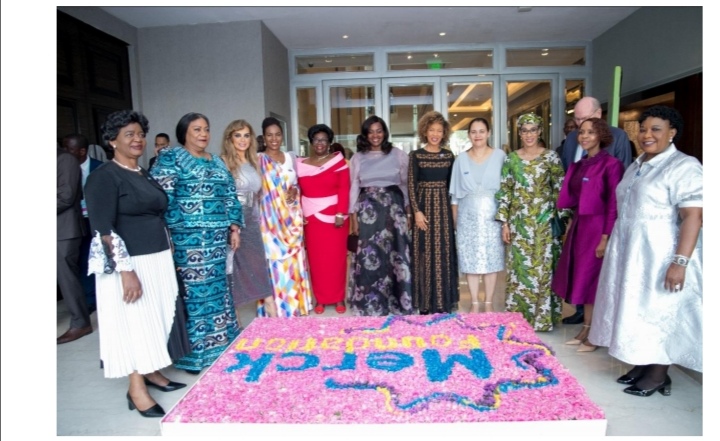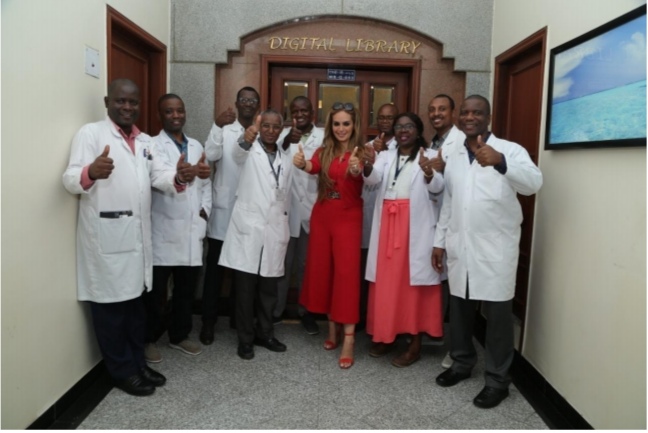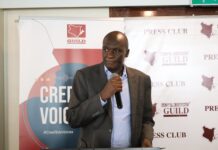By Calister Bonareri
Nairobi, Kenya: In a transformative initiative that resonates with the theme of ‘Close the care gap’ on World Cancer Day, Merck Foundation, the philanthropic arm of Merck KGaA Germany, has illuminated the landscapes of Chad and Burundi by training their first Oncologists. This milestone marks a significant leap forward in the battle against cancer in countries where the lack of local oncologists has posed a substantial threat to the lives of countless individuals.
In Chad, Dr. Mahamat Saleh Mahamat Baldass has become the country’s first Medical Oncologist. His training, completed through a one-year Oncology Fellowship in India funded by the Merck Foundation, has enabled him to treat cancer patients within Chad itself. Before this, patients often had to travel abroad for treatment, which was not just logistically challenging but also financially draining.
Similarly, in Burundi, Dr. Sylvestre Bazikamwe achieved a milestone by completing a one-year Fellowship in Gynae-Oncology. His focus is now on establishing a new Gynae-Oncology operating room and training his team to provide timely and effective surgical treatments. The impact of this initiative extends beyond individual success stories, signaling a new era in cancer care for these nations.
The absence of local oncologists in Chad and Burundi had dire consequences. Patients faced the burden of seeking treatment abroad, often leaving them with hefty bills and logistical challenges. Moreover, late-stage diagnoses were common due to the limited availability of cancer treatment facilities.

These groundbreaking achievements are part of a broader effort across Africa to bridge the gap between the increasing number of cancer cases and the limited number of oncologists. The training program covers various specialties like Medical Oncology, Surgical Oncology, Pediatrics Oncology, and Gynecology Oncology, aiming not only to increase the number of oncologists but also to create comprehensive cancer care teams.
While Chad and Burundi mark significant progress, the broader African continent still grapples with alarming cancer statistics. Annually, around 1.1 million new cases are reported, resulting in up to 700,000 deaths. Late diagnoses and limited access to cancer treatment facilities contribute to the high mortality rate.
Kenya, like many African nations, faces challenges in cancer care. The National Insurance Fund does not cover all the costs associated with cancer treatments, leaving patients to bear a significant financial burden. This gap in coverage adds another layer of difficulty for individuals already facing the daunting challenges of cancer.
The stories of Dr. Baldass and Dr. Bazikamwe exemplify the impact of locally trained oncologists on communities. Beyond providing medical care, they represent a beacon of hope and resilience. The ripple effects extend beyond individual beneficiaries, influencing entire communities that witness the transformative power of accessible cancer care.
As we celebrate these milestones, it is crucial to recognize the ongoing efforts by organizations like the Merck Foundation, to bring positive change to the cancer care landscape in Africa. The journey is far from over, and the commitment to training more oncologists and creating multidisciplinary cancer care teams remains steadfast.
In the words of Dr. Mahamat Saleh Mahamat Baldass, “This training has not only changed my life but also the lives of those I can now treat within my own country.” These words echo the sentiment shared by many individuals who, thanks to locally trained oncologists, no longer need to face the overwhelming challenges of seeking cancer treatment abroad.
Senator Dr. Rasha Kelej, the CEO of Merck Foundation, highlighted the program’s broader objective to establish multidisciplinary oncology care teams across Africa, covering various specialties. The aim is not only to increase the number of oncologists but also to create a holistic approach to cancer care, involving Medical Oncology, Surgical Oncology, Pediatrics Oncology, Gynecology Oncology, and more.
The future holds promise as more countries work towards training their first oncologists and building comprehensive cancer care teams. It is a shared commitment towards a better future, where access to quality cancer care is a reality for all, reducing the burden on patients and their families across the African continent.
Merck Foundation marks this year’s World Cancer Day together with Africa First Ladies and Ministries of Health through building cancer care capacity and increasing the limited number of oncologists in their countries by providing more than 140 Scholarships of One-, two- and three-year fellowship, diploma and Master Degree of oncology to African doctors from 28 Countries.














